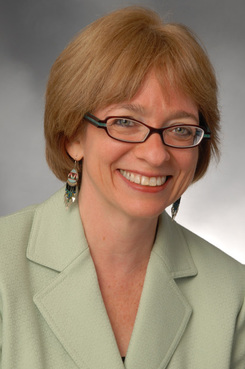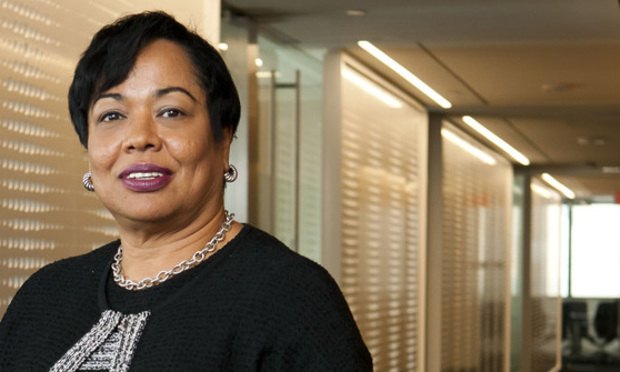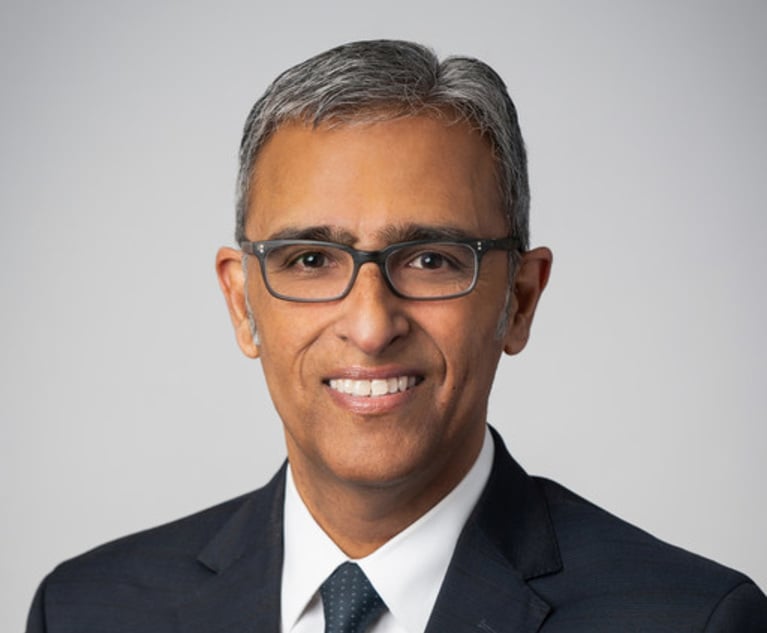Chai Feldblum, Obama-Era EEOC Member, Joins Morgan Lewis as Partner
“For companies and organizations that want to seize this moment to have the best workplaces possible, we will be there to help,” Chai Feldblum says. She is joining the firm with Sharon Masling, her former chief of staff.
February 19, 2019 at 06:00 AM
6 minute read
 Chai Feldblum (Courtesy photo)
Chai Feldblum (Courtesy photo)Chai Feldblum, a longtime civil rights advocate and former Obama-era member of the U.S. Equal Employment Opportunity Commission, is joining the management-side firm Morgan, Lewis & Bockius in Washington as a partner.
Morgan Lewis said it was hiring Feldblum and her former chief of staff, Sharon Masling, to be a part of a team conducting investigations and cultural assessments at companies. Masling also will be a partner. The two lawyers worked at Georgetown University Law Center before joining the EEOC. They will start Feb. 25 at Morgan Lewis.
Companies have increasingly turned inward amid the #MeToo reckoning, as a new spotlight was trained on sexual misconduct and power imbalances between men and women in the workplace. At the EEOC, Feldblum had been a champion of preventive measures companies can take to minimize harassment.
Philadelphia-based Morgan Lewis, one of the country's largest management-side law firms, has played a leading role in conducting internal probes at companies, and Feldblum and Masling will contribute to that work. Feldblum said a plaintiffs firm wasn't a great fit for the type of preventive assessments and counseling she wants to focus on.
“It seems common sense to me now, but it certainly didn't six months ago,” Feldblum said, explaining her decision to join a management-side firm. “When we realized we can't do this work at the EEOC anymore, we said, 'Let's just take what we were doing and do it from the outside.'”
Feldblum, the first openly lesbian commissioner at the EEOC, would serve eight years there until January 2019. President Donald Trump renominated Feldblum for another term, but Senate Republicans on Capitol Hill blocked the nomination. Conservatives had accused Feldblum of placing greater weight in LGBT equality over religious freedom, a charge she has denied.
Feldblum said she began to plot her next move when it seemed there was a good chance she would not return to the commission. She and Masling decided they wanted to advance the work they'd begun at the EEOC, which issued a report in 2016 outlining ways companies could work to reduce harassment.
Feldblum and Masling said they initially thought about creating a nonprofit, funding a venture on their own or partnering with a plaintiffs firm. Civil rights shops “seemed like a natural location for us. We started there, but we were really looking for preventative work,” Feldblum said. “We wanted to help big employers. I wanted to reach those who are hiring thousands of workers. That's not the traditional type of service that a plaintiffs firm will provide.”
Grace Speights, head of the labor and employment group at Morgan Lewis, was a leading partner on investigations the firm was hired to conduct for corporate clients. The firm's public work included investigations at the Humane Society and NPR.
 Grace Speights (Photo: Diego M. Radzinschi//ALM)
Grace Speights (Photo: Diego M. Radzinschi//ALM)“We are focusing on how we can help employers, especially large employers, to develop a culture where their workers can thrive,” Speights said.
Masling and Feldblum will not be litigating cases. They plan to meet with senior leaders to get a sense of what the companies already have in place, do a cultural assessment of workplaces and develop and help clients implement plans that includes ideas for leadership, accountability, policies, procedures and training.
“For companies and organizations that want to seize this moment to have the best workplaces possible, we will be there to help,” Feldblum said. “Our end goal will be to help them create a workplace culture in which harassment on any basis doesn't happen in the first place—and if it does happen, that they have a system in place to deal with that promptly and appropriately.”
Masling said the fact Morgan Lewis was using the EEOC's 2016 report attracted them to the firm. “We are translating policy into practice,” Masling said.
Emily Martin, who leads advocacy and policy initiatives at the National Women's Law Center, said the moves of Feldblum and Masling to Morgan Lewis were initially surprising but joining the firm will allow them the chance to work with companies on issues the two lawyers care passionately about.
“They want to engage with employers and find what works and moves the needle,” Martin said.
➤➤ Get employment law news and commentary straight to your in-box with Labor of Law, a new Law.com briefing. Learn more and sign up here.
Jumping from an agency to a big law firm will mean an adjustment, Martin said. She said a primary question she'd ask herself would focus on whether the effort is making workplaces better or instead only defending problematic behavior. “They feel confident about the answers they received,” Martin said.
Joseph Sellers, partner at the plaintiffs firm Cohen Milstein Sellers & Toll, said Feldblum and Masling will be able to bring their knowledge and skills to an existing platform and have a voice in guiding large employers.
“They aren't just offering to assist employers and others with problems that arise but offering to do deep dives into the culture and the workplace dynamics that may provide the context to assess whether the problems exist,” Sellers said. “That could be an incredibly valuable service to provide.”
Read more:
Chai Feldblum Reflects on Her EEOC Tenure
Susan Harthill Leaves US Labor Solicitor's Office for Morgan Lewis
Inside the Morgan Lewis Investigation of Alleged Misconduct at NPR
Trump EEOC Nominee Daniel Gade Says He Withdrew Amid 'Political Mess'
Justice Dept. Takes Stance Against Transgender Rights—and the EEOC
This content has been archived. It is available through our partners, LexisNexis® and Bloomberg Law.
To view this content, please continue to their sites.
Not a Lexis Subscriber?
Subscribe Now
Not a Bloomberg Law Subscriber?
Subscribe Now
NOT FOR REPRINT
© 2025 ALM Global, LLC, All Rights Reserved. Request academic re-use from www.copyright.com. All other uses, submit a request to [email protected]. For more information visit Asset & Logo Licensing.
You Might Like
View All
Weil Adds Acting Director of SEC Enforcement, Continuing Government Hiring Streak
3 minute read

Law Firms Expand Scope of Immigration Expertise Amid Blitz of Trump Orders
6 minute readTrending Stories
- 1Eighth Circuit Determines No Standing for Website User Concerned With Privacy Who Challenged Session-Replay Technology
- 2Superior Court Re-examines Death of a Party Pending a Divorce Action
- 3Chicago Law Requiring Women, Minority Ownership Stake in Casinos Is Unconstitutional, New Suit Claims
- 4GOP Now Holds FTC Gavel, but Dems Signal They'll Be a Rowdy Minority
- 5Houston-Based Law Firm Overcomes Defamation Suit for Website Warning
Who Got The Work
J. Brugh Lower of Gibbons has entered an appearance for industrial equipment supplier Devco Corporation in a pending trademark infringement lawsuit. The suit, accusing the defendant of selling knock-off Graco products, was filed Dec. 18 in New Jersey District Court by Rivkin Radler on behalf of Graco Inc. and Graco Minnesota. The case, assigned to U.S. District Judge Zahid N. Quraishi, is 3:24-cv-11294, Graco Inc. et al v. Devco Corporation.
Who Got The Work
Rebecca Maller-Stein and Kent A. Yalowitz of Arnold & Porter Kaye Scholer have entered their appearances for Hanaco Venture Capital and its executives, Lior Prosor and David Frankel, in a pending securities lawsuit. The action, filed on Dec. 24 in New York Southern District Court by Zell, Aron & Co. on behalf of Goldeneye Advisors, accuses the defendants of negligently and fraudulently managing the plaintiff's $1 million investment. The case, assigned to U.S. District Judge Vernon S. Broderick, is 1:24-cv-09918, Goldeneye Advisors, LLC v. Hanaco Venture Capital, Ltd. et al.
Who Got The Work
Attorneys from A&O Shearman has stepped in as defense counsel for Toronto-Dominion Bank and other defendants in a pending securities class action. The suit, filed Dec. 11 in New York Southern District Court by Bleichmar Fonti & Auld, accuses the defendants of concealing the bank's 'pervasive' deficiencies in regards to its compliance with the Bank Secrecy Act and the quality of its anti-money laundering controls. The case, assigned to U.S. District Judge Arun Subramanian, is 1:24-cv-09445, Gonzalez v. The Toronto-Dominion Bank et al.
Who Got The Work
Crown Castle International, a Pennsylvania company providing shared communications infrastructure, has turned to Luke D. Wolf of Gordon Rees Scully Mansukhani to fend off a pending breach-of-contract lawsuit. The court action, filed Nov. 25 in Michigan Eastern District Court by Hooper Hathaway PC on behalf of The Town Residences LLC, accuses Crown Castle of failing to transfer approximately $30,000 in utility payments from T-Mobile in breach of a roof-top lease and assignment agreement. The case, assigned to U.S. District Judge Susan K. Declercq, is 2:24-cv-13131, The Town Residences LLC v. T-Mobile US, Inc. et al.
Who Got The Work
Wilfred P. Coronato and Daniel M. Schwartz of McCarter & English have stepped in as defense counsel to Electrolux Home Products Inc. in a pending product liability lawsuit. The court action, filed Nov. 26 in New York Eastern District Court by Poulos Lopiccolo PC and Nagel Rice LLP on behalf of David Stern, alleges that the defendant's refrigerators’ drawers and shelving repeatedly break and fall apart within months after purchase. The case, assigned to U.S. District Judge Joan M. Azrack, is 2:24-cv-08204, Stern v. Electrolux Home Products, Inc.
Featured Firms
Law Offices of Gary Martin Hays & Associates, P.C.
(470) 294-1674
Law Offices of Mark E. Salomone
(857) 444-6468
Smith & Hassler
(713) 739-1250









